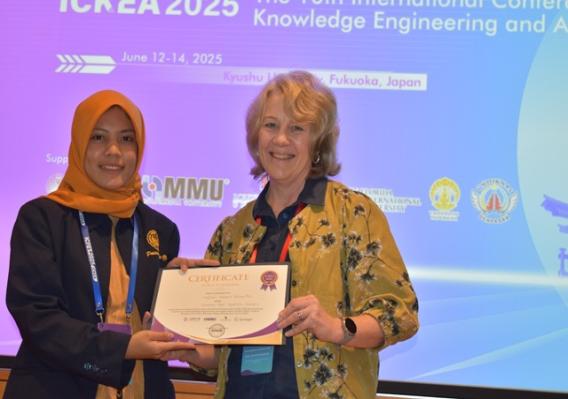UNY Student Wins Best Presentation in Japan: Discusses the Role of Artificial Intelligence in Sustainable Chemistry Education

A master’s student of Chemistry Education at the Faculty of Mathematics and Natural Sciences (FMIPA), UNY, Hajidah Salsabila Allissa Fitri, has brought honour to Indonesia at the international forum The 10th International Conference on Knowledge Engineering and Applications (ICKEA 2025) held at Kyushu University in Fukuoka, Japan. In a prestigious forum involving participants from 13 countries, she earned the “Best Presentation” award for her paper on the integration of artificial intelligence (AI) in sustainable and environment-friendly chemistry education (“green chemistry education”).
In her research, Hajidah mapped global research trends showing a significant surge in publications since 2021, aligned with increased global attention toward digital transformation and sustainability issues in education. “AI is not just a teaching aid, but also a solution for simulating environmentally-friendly chemical processes, modelling safe reactions, up to emission data analysis,” she said. She pointed out that from the pedagogical side, integration of AI in green chemistry education is still under-developed.
Hajidah, from Srumbung, Magelang, noted that the United States, India, and China dominate publications in this field. However, global research collaboration remains fragmented. “Many studies are done in small groups without cross-country or inter-institution synergy,” she explained. She also pointed to institutions such as the Centre for Computational Toxicology and Exposure (USA), University of Campinas (Brazil), and National Kaohsiung University of Science and Technology (Taiwan) as active contributors in the interdisciplinary field.
Other findings showed that research on AI in green chemistry is scattered across interdisciplinary journals such as ACS Sustainable Chemistry and Engineering, Bioresource Technology, and PLOS ONE. One of the most influential papers is by Schweidtmann AM, discussing optimization of chemical processes using AI. “Interestingly, research quality from countries with smaller quantitative contribution can still yield high global citation impact,” she added.
She concluded that merging AI and green chemistry in education needs to be strengthened with systematic, contextual, and inclusive learning models. She urged for wider international research collaboration and policy support to make sustainable educational technologies accessible equitably. This research is a significant contribution from UNY to the international discourse on 21st-century science education.
The success of Hajidah at ICKEA 2025 further underscores the potential of Indonesian students on the global stage. The conference involved academics from Japan, Indonesia, Taiwan, Algeria, China, Malaysia, the UK, the Philippines, Austria, Saudi Arabia, Cyprus, and Vietnam. UNY gave high appreciation for this achievement as part of its commitment to cultivate young scientists who are competent and globally minded.






